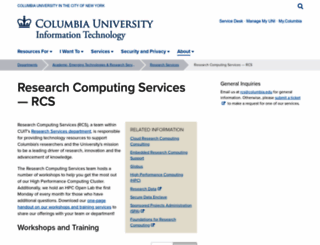Research Computing Services — RCS | Columbia University Information Technology
Page Load Speed
3.7 sec in total
First Response
50 ms
Resources Loaded
2.7 sec
Page Rendered
1 sec

About Website
Visit rcs.columbia.edu now to see the best up-to-date RCS Columbia content for United States and also check out these interesting facts you probably never knew about rcs.columbia.edu
workshops training google cloud platform high performance computing hpc linux classes cloud computing research
Visit rcs.columbia.eduKey Findings
We analyzed Rcs.columbia.edu page load time and found that the first response time was 50 ms and then it took 3.7 sec to load all DOM resources and completely render a web page. This is a poor result, as 60% of websites can load faster.